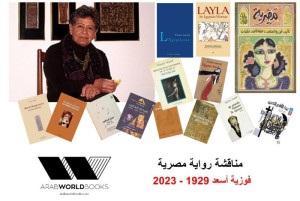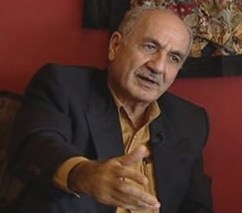Boston University
“Did you hear the doorbell ring?” He asked her, his eyes still closed.
“Go back to sleep--it’s the athan(1).
She turned her back to him, and her head sank under the quilt as faint echoes of the athan reached her. “Prayer” it said, “is better than sleep.”
“That’s strange. It isn’t even five O’clock. What athan is this? Somebody is messed up.”
“Go back to sleep, will you? It’s the Shafi’i athan. It’s always earlier than the others. Let me have some sleep.”
He groaned and pulled the quilt over his head.
The doorbell ran again. He pushed the quilt away and said, “I say the door bell, and you say the Shafi’i athan!”
She tuned the lights on. Who would come at such an hour? She thought. She sat up. For a while he didn’t know what to do, and then he got up. His face was still showing the power of sleep.
“Don’t open the door,” she said terrified. Don’t even go downstairs.”
“Does this make sense?”
“Please ignore them. Stay here.”
“They’ll keep ringing the bell and if they believe no one is home, they might break in and kill us.”
He put on his robe de chambre and made sure it was tightly wrapped around his body. He opened a drawer and took a gun. She watched in horror.
“Do you know how to use it?”
“You just press the trigger. Abu Khalid taught us. It’s not rocket science.”
“I’m coming down with you. Careful when you go down, you’re in your sixties.”
His heavier steps made up for his lack of mobility.
“Don’t open the door,” she said. “They gunned down Umm Sami’s household as soon as the door was opened.”
“I know.”
“Perhaps they have already broken in and they are hiding around the house or in the driveway behind the car, the way they did with the jeweler Abu Amir. They slaughtered all of them.”
Distracted, he felt the gun was heavy. Couldn’t Abu Khalid have found a lighter one? There are guns half this one in size and weight. The size of the palm, and he brought me one from the Ottoman era. At least two kilos. ‘Yes, doctor, it’s heavy, but it’s the sure thing,’ he said.
“I’ll switch the lights on” he said, “and you look at the driveway and around the house.”
“But don’t rush to open the door before I get down.”
He switched on all the lights on the upper floor, the garage, and the driveway, and went to open the door after he heard her descending steps. He went out to open the house gate. The biting January air seemed to penetrate his bones and he pulled with his free hand the upper end of his robe to cover his neck. The gun was in his other hand. From the darkness beyond, the athan was still coming intermittently. His wife, glum, walked with him whispering her wonder who would be coming at such an hour. As they approached the gate, she separated the door key and the key to the additional chain and padlock from the rest of the keys. His frozen fingers managed to unlock the door, but not the padlock, and he pushed the door slightly. He could see a man in his forties in military uniform; his wide smile betrayed tired features. A black Mercedes was parked at the door.
“Don’t be afraid. Open the door,” he said.
“Who are you?”
“From the Presidential Office.”
His heart shot fresh, hot blood into his body, and sweat banished the freezing cold. His wife leaned against him to control her shudder. She tried but could not repeat what the man just said.
“There’s really no cause for fear,” the military man’s voice came through the frozen door. “It’s nothing--just a few minutes. Just come with us.”
“Where to?”
“To the Presidential Office.”
“Why not wait till the morning?” she asked with a quivering voice.”
The military man’s smile nearly vanished, but he seemed determined to get what he came for, and the smile persisted.
“His Excellency the President himself asked for him,” he said.
He looked at his wife, who struggled not to cry.
“What for?” he asked.
“It’s just a matter of five minutes.”
He hesitated and feared the man on the other side of the door might interpret it as unwillingness to comply. The military man facing him at this frozen hour of the night knows nothing but compliance. He won’t be patient for long.
“Give me some time to change,” he said slowly, dogged by fear and anxiety.
“Take your time.”
He walked back toward the house and suddenly felt cold again. His wife walked ahead of him, visibly upset.
“Do you want to go?” she said as soon as they were inside. “Who knows what they’ll do to you? They must have been watching us. They must be aware Dr. Ibrahim was here yesterday. That’s why they came for you. His cousin and the father of his eldest son’s wife died while in Dr. Ibrahim’s care and you think they’ll let the doctor go? You believe that? This is not Europe. Not in your wildest dreams.”
“Why would they punish him? What has he done? He told me the story a number of times. The whole story. You laughed when he told it in front of you. They brought him that relative forty days after the dog’s bite. What could he do to save him? The viral infection destroyed his nervous system.”
He could visualize Dr. Ibrahim’s face as he told the story. He could also invoke the sympathetic face of his wife, Wadia as she listened. Ibrahim said he thought the hospital turned into a war zone when the republican guards brought him in. A row of armored vehicles followed by a procession of presidential automobiles. The blaring horns and the deafening sirens. The whole hospital was besieged, and soldiers with semi-automatic rifles rushed in throngs. All one could hear was comrade Rakan Mihqan Mizban, his Excellency Rakan Mihqan Mizban, Lieutenant General Rakan Mihqan Mizban(2). We all laughed when Ibrahim asked if we heard of him. Rumor had it he was a herdsman who made it to the rank of Lieutenant General in no time.
“The door to the examination room was kicked open,” Ibrahim told us one day, “and a special force lieutenant colonel, armed to the teeth, forced his way. I was examining an old lady, and for a second I didn’t know what to do. He looked at me defiantly, and I left the patient and went out with him. The corridors were swarming with soldiers and one could hardly move among them. On our way to see Rakan Mihqan Mizban I told the colonel that the soldiers should vacate the hospital. They could do what was necessary and leave so that we do our job. He was nearly gone when I saw him. Drooling, his eyes red, high fever. They said he had bit everyone he could--his wife, two of his sons, his daughter. Then he bit a few animals--his dog and horse. They locked him up in a room till he collapsed. We had to quarantine him. We got the vaccine from Jordan that day via a helicopter, and vaccinated his four wives, his children, his thirty-seven grandchildren, his battalion of shepherds. I went myself to the Presidential estates--huge and swarming with all kinds of cattle. I told them that he might die in two days, and that he should be quarantined. They insisted on taking him away, and signed papers to that effect. I kept the papers with his sons’ signatures.”
“But they’ll go after Dr. Ibrahim,” my wife said. “You’ll see.”
“You’re exaggerating. Ibrahim called me today from the hospital and told me a bunch of jokes. We had a good laugh.”
“Why do they send for you at such an hour then?”
“How can I know?”
“This is your problem. I have been begging you for ten years to leave and join our kids abroad. All your colleagues left. Is this life we lead here? We die a hundred times everyday. Why are we staying behind?”
He was still putting on his clothes. He picked up the pieces quietly. A silk tie with fiery red dashes on a pristine blue background. He didn’t forget his favorite eau de cologne.
“What are they going to do to you?” She was crying now.
She wiped the tears away before she said good-bye. She did not feel the cold this time, but it took her quite sometime to secure the chain and padlock. The lock was certainly frozen this time. The loneliness she felt then terrified her and kept her at the door for a while. The Mercedes left followed by two military escorts. She had no idea where these two vehicles came from. She started crying again. His look and smile and wave before he disappeared into the car were still fresh in her mind. Was that wave to assure her or bid her farewell? She hoped he was as quiet as he looked, because he used to think if he was then no harm could happen to him. Perhaps that was why he smiled. A signal that he would come back. She was almost sure of that.
The military man asked him to fasten his safety belt, and when he was surprised, he said these were the orders. Then he pulled a black blindfold from his pocket and politely asked to blindfold him. He was relieved that they did not handcuff him.
He was not as much concerned about himself as he was about her, being away from her children, and now lonely and terrified. She would surly go down if he was to disappear. Life can be an inscrutable trap for this vulnerable, silly thing we call man. Only a few hours ago he was the owner and director of one of the county’s best hospitals, and now he’s blindfolded and as much in control of his fate as a goat on the way to the slaughterhouse. His fear increased as the car started to speed up, its brutal raw power violating the quiet of the night. He saw why the man insisted on fastening the safety belt. They always dart on the streets crushing on their way not only traffic rules, but the property and lives of those not fortunate enough to escape them. He had no idea how long the nightmarish trip took. When the man removed the blindfold, he looked at his watch and was surprised when he saw it was merely twenty minutes.
“Don’t say any thing to those you come across. Live cameras are everywhere. I hope you heed this advice,” the man told him before he was let out of the car.
It did not look like he was a guilty person and he felt somehow assured. He found himself in a garage surrounded by dark gray concrete and yellowish lights. What a depressing environment. A row of new cars of all models crowded the vicinity. No war or embargo even touched this place, he thought. He was there for perhaps five minutes. The freezing, blowing winds suggested that the place was in a desolate area out of town. The man motioned him to stay in front of him, and soon they stopped in front of an elevator. A sparkling, gray metal door opened as soon as the man pressed the keypad. The elevator was big, elegant and warm, and it somehow gave him the impression it was familiar, but he could not remember where he saw it. Its sides were of polished hard wood and mirrors and they bore pictures of national archaeological pieces. Was this similar to an elevator he saw in a five-star hotel he stayed in two years ago? What a dead memory!
The elevator descended fast and when it stopped its door opened on the other side. A wide, long corridor, with beige sides on which hung copies of celebrated world pieces. Again, he had the feeling of familiarity with the place. Where? Where?
“This way, please.” The military man said. In front of him was a short, bald man, heavy with no facial hair. He was wearing dark glasses and the green uniform of the Popular Army.
“The doctor?” he asked. His voice was sharp, his features frozen. When he saw the man’s face was fixed in one direction, he realized he was blind.
“Yes,” he said.
“He was not sure how to behave with the blind man. The military man has disappeared, but the blind man came to his aid when he gestured him to walk along his side. It was rather warm, so he took off his coat and carried it on his arm. They turned and soon came to another elevator. The man dexterously pressed the button and he wondered if he was indeed blind.
“Go ahead,” he said. The elevator looked like the first. Is this deliberate to give the comers the illusion they’re in the same place? But that did not make sense. The elevator descended one floor, and again its door opened on the other side where another blind man was waiting for him.
Had he not been a little taller than his predecessor, he would have suspected his faculties. Same outfit, same clean-shaven face, same stern features. Perhaps they were brothers? That didn’t really bother him, but what did was the mystery of repeating the elevator routine five more times. When he reached what would have been the seventh underground floor, he didn’t find a blind man, but a slim young man in his thirties. Perhaps a nurse. He signaled him to follow him.
He dumped the thoughts that were occupying him about the blind men and the single floor downwards rides, and somehow convinced himself that he was more like a goat. Yes, just that. The corridors again struck him as familiar, even though now they seemed circular and endless. They approached one with doors on both sides, and he had a feeling that there were people behind those doors watching. All the doors were ajar. Were there gun barrels sticking out of some of them?
“This way, please”
A door opened to his left, and he saw a lavatory over which hung a big mirror, an examination table, two closets, chairs, a desk, and a physician. A beaming smile and brown eyes, big and lively. These features were familiar, too, like the elevators and the corridors. Perhaps, his mind had began to falter. This was not a dream, was it?
“In here, please.”
The nurse was standing behind him.
“Undress,” the doctor said as he pushed his fingers into examination gloves.
He was silent and merely looked at the doctor.
“Undress, please.” He repeated.
“Take off my clothes?” he finally managed to say.
“Yes.”
The nurse took his coat and hanged it on a white plastic hanger. Then he helped him out of his jacket, and even smiled when he helped him with his tie and shirt and under shirt. His chest was fully exposed, covered with white hair. Well, the hair on his arms was still black. Then the nurse unhooked his belt. That surprised him, and his look implored the doctor who was in a world of his own watching a sea program on television. A shark ferociously attacking an unsuspecting prey. When the nurse gently pulled his underwear, he hanged on to it with both hands. The doctor turned away from his sharks and said with a sweet smile:
“Everything, sir.”
When he heard “sir” he thought the doctor was a former student of his, but he could not remember his name or when he taught him. That was a trivial matter now, and what mattered more was his humiliation, standing there completely naked. The doctor smiled when he covered his genitalia with his hands.
What was the point behind all of this? And the military man told him it was a matter of five minutes. The doctor motioned him to lie down on the table. The nurse took away his watch. As he lay down, stressed, he covered his middle with both hands. He saw two cameras hanging from the ceiling. Why two? Perhaps one for him, the other for the doctor? He closed his eyes and recalled the military man’s worrying about the live cameras and about talking to anyone. He was about to cry when the doctor asked him to open his mouth and say “ah.” He tried to avoid looking at the cameras as he wondered why would they examine him while he was a doctor himself? The doctor was doing his routine quickly as if he wanted to get over with it.
“Turn around.”
What a shame! Naked and flat on his belly. No problem with the doctor, but those behind the two cameras! He was able to tell the course of the stethoscope before it moved from one spot to the next. When he thought the exam was over he wanted to get up and put on his clothes.
“One minute, sir.”
He felt the doctor’s finger poking at his rectum. He himself has done that to patients, but why is it done to him here?
“That’s it, sir.”
He leapt to the floor. He wanted to speak his mind, but remembered the military man’s warning. He headed toward his clothes, but the doctor stopped him. In no time the nurse was helping him into a white cotton apron like the one he used to wear, and he gave him matching pants and white rubber shoes. The nurse knelt on the floor to help him break into the shoes.
They left the examination room and shortly stopped in front of a dark glass panel. When it opened, the nurse asked him to step in by himself. He did, and the glass panel closed behind him. He took a few steps in an elegant big hall and came to another glass panel. When it opened, he found himself in a massive hall. In the middle of the room, a man in dark green silk pajamas was laying down on a rocking chair. He was watching a wrestling match between two giants on a wide screen television. The reclining figure was rocking quietly, its eyes closed. When he looked carefully at the figure and recognized it, he nearly froze. The reclining figure continued to rock, eyes closed, features worn out. He could see his skin color clearly--light brown with yellowish-bluish shade. In the hall’s foreground, there was a massive bed, and behind it a floor-to-ceiling case that had a few books on one of the top shelves, but was mostly filled with exotic artifacts. The other side of the hall had a huge fish tank with exotic fish of all colors and types.
He was becoming unsettled, and it was becoming harder and harder to control his emotions. The reclining figure luckily spoke without opening his eyes.
“Is rabies contagious even without contact?”
He was not sure he understood the question. The words were clear, the voice powerful, but what was he asking for exactly?
“I beg your pardon?” he blurted out.
The reclining figure’s eyes remained closed, and he neither looked at him, at the clashing giants on television, or the nearby two purple fish that seemed to exchange a long passionate kiss.
“Does the flue virus travel through the air?” the figure asked, his eyes still shut.
“It depends on the distance.”
“This same distance between us.”
“There’s a chance of possibly 10%.”
“What about rabies?”
“What about it?”
“Is it contagious without contact?”
“No.”
“Does one catch the virus because of a hand shake?”
“No.”
“Are you sure?”
“Absolutely.”
The reclining figure opened his eyes for a second. He could see redness in the eyes, perhaps due to some ailment or lack of sleep. One giant was dancing on the back of his opponent, raising his hands in gleeful euphoria. The two purple fish had disappeared in the massive tank.
The glass panel opened behind him and he heard a voice from the distance.
“This way, doctor.” He had no idea how the reclining figure communicated to his entourage that the meeting was over.
He turned around and left.
In the examination room, he saw neither the physician nor the nurse. He put on his clothes in a hurry. He felt an urge to cry but the presence of two cameras stopped him. He was tying his shoestrings when the nurse came in.
“This way.”
“Where to?”
“Home.”
He stood up elated and stepped out of the room, the urge to cry still tormenting him.
Baghdad 1999.
(1) Athan is the call for prayer. The Shafi’i is one of the four major Sunni doctrines.
(2) For Iraqis, the name invokes names of former Iraqi president Saddam Hussien’s relatives who had prominent official and party positions, especially his two half brothers Barzan and Watban. “Mihkan” in Iraqi Arabic means funnel.
Translation Shakir Mustafa
Figure in Repose
By: Mahmoud Saeed - on: Monday 23 October 2017 - Genre: Stories
Upcoming Events

Joseph Conrad's Heart of Darkness Discussion
April 27, 2024
Join us for a special discussion of Joseph Conrad&...

A writer, a vision, a journey: a conversation with Francis Boyle
February 24, 2024
This event took place on 24 February 2024 Yo...

Discussion of Fawzia Assaad’s An Egyptian Woman
November 25, 2023
In celebration of the life and outstanding achieve...

Toni Morrison's The Bluest Eye, A Presentation and Discussion
October 28, 2023
This presentation and discussion of Toni Morrison&...
